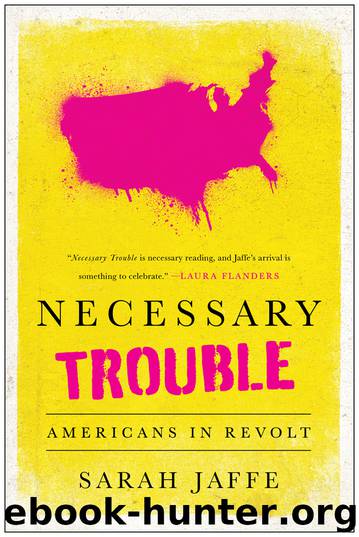Necessary Trouble by Sarah Jaffe

Author:Sarah Jaffe
Language: eng
Format: epub
ISBN: 9781568585376
Publisher: Nation Books
Published: 2016-07-14T16:00:00+00:00
IT HAS ONLY BEEN RELATIVELY RECENTLY THAT ABORTION AND GAY rights were assumed to be the major concerns of people of faith. For much of US history, when politicians took a stand based in their faith, it was likely to be a prophetic call for justice, for liberty, and for redistribution of wealth to the poor. The abolitionists, in challenging the institution of slavery, drew on a deeply moral language: it was an outrage to enslave and abuse another human. John Brown, the white abolitionist who was hanged for his 1859 raid on Harpers Ferry in an attempt to start a slave revolt, was driven by his faith, as was Nat Turner, a popular religious leader among his fellow slaves who in 1831 felt that God had called him to rebel and lead them to freedom. William Jennings Bryan, the early twentieth-century orator nominated for president by Democrats and Populists, used Christian imagery to deride what he saw as an obsession with profits over people: “Man, the handiwork of God, comes first; money, the handiwork of man, is of inferior importance.”14
The famed “Scopes Monkey Trial” pitted Bryan against another Populist-identified attorney, Clarence Darrow, in a 1925 legal case over teaching the theory of evolution in the public schools in Tennessee. The trial helped drive a wedge between Christians and secularists, beginning a trend among urban secularists, often liberal, of mocking believers for their beliefs. It did not put an end, however, to calls for economic justice based in moral language. Eugene Debs, the labor leader and five-time Socialist Party presidential candidate, was known for his preacherly style and his ability to hold audiences rapt for hours as he appealed to their sense of justice on behalf of the working class.15
For nearly as long as economic reformers have appealed to moral values, there have been moral panics that revolved around controlling sexuality and what was considered “vice.” Reformers like Anthony Comstock, of the New York Society for the Suppression of Vice, tried to stamp out prostitution and ban access to birth control (or even its mention). There was also a healthy dose of moralizing about the behavior of the poor among the Progressive-era reformers, arguments that were updated in the twentieth century into the “culture of poverty.”
Anticommunists used moralistic language against the Communist Party’s labor and voting-rights organizing among black workers, accusing the party of intending to nationalize white women and associating it with promiscuity, free love, and homosexuality. Queer people and communists both were seen as corrupting America’s moral fiber, destroying families, and plotting to undermine the country.16
The civil rights movement, particularly the pieces of it that remain in the forefront of Americans’ memories and in history classes, may be the most prominent justice movement in US history to rely heavily on biblical language and moral appeals. Rev. Martin Luther King Jr. and the other members of the Southern Christian Leadership Conference (SCLC) drew on skills they learned in the pulpit to captivate crowds, even while drawing upon the strategic talents of Bayard Rustin, who was openly gay and a former communist.
Download
This site does not store any files on its server. We only index and link to content provided by other sites. Please contact the content providers to delete copyright contents if any and email us, we'll remove relevant links or contents immediately.
The Secret History by Donna Tartt(16611)
The Social Justice Warrior Handbook by Lisa De Pasquale(11486)
Thirteen Reasons Why by Jay Asher(7783)
This Is How You Lose Her by Junot Diaz(5754)
Weapons of Math Destruction by Cathy O'Neil(5032)
Zero to One by Peter Thiel(4818)
The Myth of the Strong Leader by Archie Brown(4786)
Promise Me, Dad by Joe Biden(4441)
Stone's Rules by Roger Stone(4413)
Beartown by Fredrik Backman(4405)
How Democracies Die by Steven Levitsky & Daniel Ziblatt(4393)
The Fire Next Time by James Baldwin(4338)
100 Deadly Skills by Clint Emerson(4072)
A Higher Loyalty: Truth, Lies, and Leadership by James Comey(4027)
Rise and Kill First by Ronen Bergman(4009)
The David Icke Guide to the Global Conspiracy (and how to end it) by David Icke(3876)
The Farm by Tom Rob Smith(3870)
Secrecy World by Jake Bernstein(3774)
The Doomsday Machine by Daniel Ellsberg(3726)
